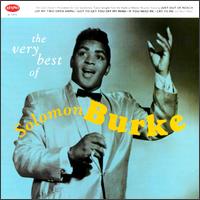 Working
for Atlantic Records in the 60's must have been tough on Solomon
Burke. He wasn't as good looking as Wilson Pickett, as flashy as Otis Redding,
or as funky as Joe Tex. Despite some groovy hits, he never achieved the legendary
status of many of his peers. Never mind, though, because his gentle, sermonesque
songs have stood the test of time. Burke's deft baritone and effortless mix
of blues, country, and rhythm & blues were perhaps too measured for the
kinetic, youth-driven pop market. Though he scored lots of hits, none really
broke through to a mass audience. Of the 22 Atlantic singles he placed on the
pop charts from 1961 through 1968, not one breached the Top 20. Nevertheless,
songs like "Just Out Of Reach (Of My Two Empty Arms)," "Cry
To Me," and "Got To Get You Off Of My Mind" are among the best-loved
in the rich history of soul music.
Working
for Atlantic Records in the 60's must have been tough on Solomon
Burke. He wasn't as good looking as Wilson Pickett, as flashy as Otis Redding,
or as funky as Joe Tex. Despite some groovy hits, he never achieved the legendary
status of many of his peers. Never mind, though, because his gentle, sermonesque
songs have stood the test of time. Burke's deft baritone and effortless mix
of blues, country, and rhythm & blues were perhaps too measured for the
kinetic, youth-driven pop market. Though he scored lots of hits, none really
broke through to a mass audience. Of the 22 Atlantic singles he placed on the
pop charts from 1961 through 1968, not one breached the Top 20. Nevertheless,
songs like "Just Out Of Reach (Of My Two Empty Arms)," "Cry
To Me," and "Got To Get You Off Of My Mind" are among the best-loved
in the rich history of soul music.
Under Rhino's direction, two excellent compilations of Burke's Atlantic sides
are available. The single-disc Very
Best Of Solomon Burke just might get the nod, because it includes the legendary
Soul Clan single, "Soul Meeting." Rhino's double-disc Home
In Your Heart: The Best Of Solomon Burke more than doubles the running
time of Very
Best and is superior in every way - except it doesn't have "Soul Meeting" (geez,
I hate it when they do that). The Soul Clan, by the way, was a group Burke
formed in 1968 with labelmates Joe Tex, Arthur Conley, Ben E. King, and Don
Covay. The Clan recorded but one single, which flopped. The b-side, "That's
How It Feels," is arguably a better song, and it appears on Rhino's extraordinary
(but deleted) Beg,
Scream, and Shout box.
Though his star has long faded, Solomon Burke has been ever active since the
60's, his skills as a singer and reputation as a colorful character both increasing
steadily. Rock critics and soul music fanatics, at least, hold him in the highest
of esteem, and they effuse prodigiously over records like Soul
Alive! (1985) and Don't
Give Up On Me (2002). By the dawn of the 21st century, nearly all of Burke's
soul music peers were dead, and he assumed the role of soul elder statesman
- by default, perhaps, but most assuredly through merit, as well. The self-described "King
of Rock 'n' Soul" wears his mantle in ease, both with aplomb and humility.